Activism
An 'Anti-Racist' Mob Set Its Sights on Humble ‘Squampton.’ Here’s How the Town Fought Back
Though the population is largely white, Squamish has steadily become more diverse in recent years, and now boasts a thriving Sikh community.
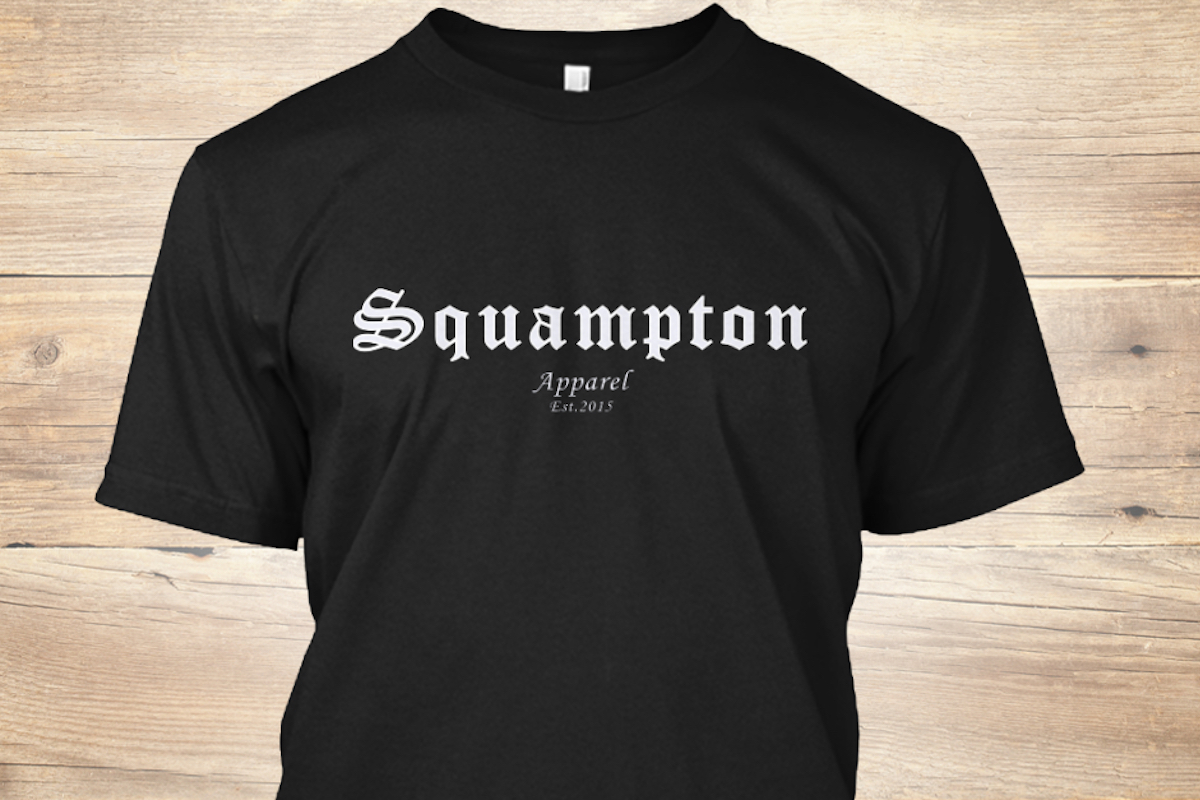
This is the sorry tale of how a confluence of unrelated developments—including the 2010 Vancouver Olympics, the excesses of real-estate developers, an outdoor-sports boom, and the death of George Floyd—transformed what was once a small, gritty western Canadian logging town into a hub of woke lunacy.
It’s also the story of a “racist” cream-filled donut, a slander campaign against an Indigenous single mother waged in the name of social justice, and an existential debate about whether a local basalt dyke may be a source of homophobic microaggression. But all in due course.
The British Columbia town of Squamish is situated at the tip of island-dotted Howe Sound, nestled between Vancouver to the south and the famous ski-resort community of Whistler to the north. It gets its name from the Squamish Nation, a Coast Salish First Nations community that, as with other Indigenous peoples across Canada, suffered mightily from colonialism—an appalling chapter in Canadian history that the country has taken laudable steps to address in recent years. Though the population is largely white, Squamish has steadily become more diverse in recent years, and now boasts a thriving Sikh community.
The town’s official slogan is “Hardwired for Adventure.” And anyone traveling the Sea to Sky highway from Vancouver to Squamish will be struck by its physical beauty. Situated just an hour from downtown Vancouver, we’ve become a world-class destination for rock climbing, mountain biking, hiking, and kiteboarding; offering visitors the chance to glimpse an impressive array of wildlife, including bears (black and grizzly), wolves, cougars, orcas, seals, salmon, and eagles. To the west stretches the stunning, snow-capped Tantalus mountains. And towering above the place like a sentinel is the huge granite monolith known as the Stawamus Chief. It’s that magnificent hunk of rock that drew me to Squamish in the first place, and which continues to draw thousands of climbers from across the globe.

I came here from the United States nearly 20 years ago, one stop on an epic three-and-a-half-year rock-climbing road trip. Living out of an ’83 VW Vanagon, I joined a ragtag crew of other climbers set on conquering a string of renowned climbing destinations, including Yosemite, Joshua Tree, Smith Rock, and Bishop, California. We moved like gypsies with the seasons, and took to settling in Squamish each summer for long, heady days of climbing and bouldering. At the time, climbing was just taking off in the area. Living was easy—and dirt cheap. Our happy little tribe camped for free along the Mamquam River. Each morning, we’d break bread together, then return in the evening to regale one another with our exploits while smoking copious bowls of what was then widely regarded as some of the best weed on the planet.
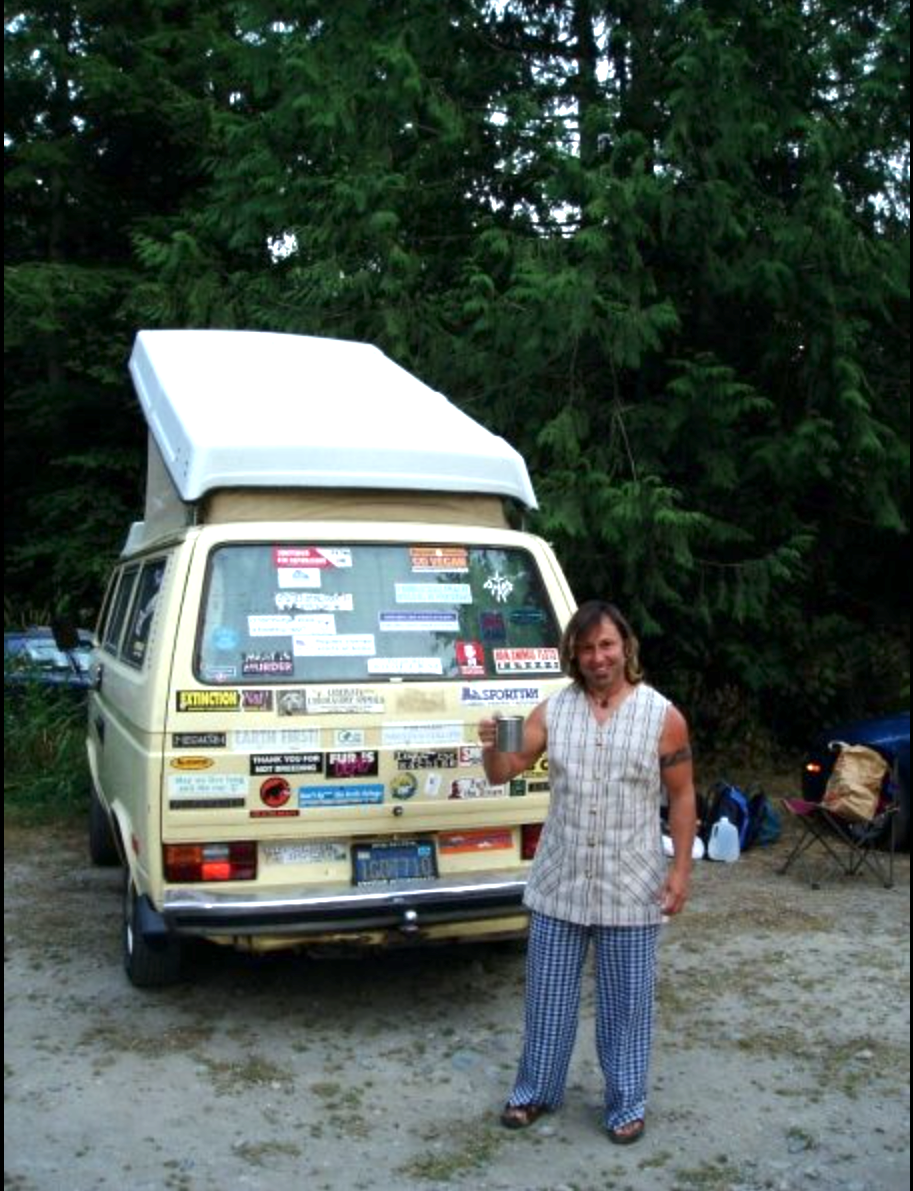
At the time, Squamish was regarded by urbanites as little more than a whistle stop on the way to Whistler. The (now defunct) Woodfibre Pulp Mill belched out a thick yellow haze that had the distinct smell of burnt hot dogs. Loggers would huddle at the Chieftain Pub to down pints of piss-thin beer and shoot pool. The influx of scruffy climbers, complete with dreadlocks and nose piercings and all the rest, was met with a wary eye from old-school residents. Yet the townies and dirt baggers (like me) maintained a sort of détente, notwithstanding our very different subcultures.
Throughout the 1990s and into the early 2000s, Squamish got hit by an economic downturn, an upsurge in domestic violence and other forms of crime, and hard drugs. Crystal meth, especially, became a problem. And it was not uncommon to see some tortured soul tweeking along Cleveland Avenue. Though Squamish’s surrounding natural beauty is magnificent, the downtown itself was—and generally remains—something of a dump.

Around 2003, some of the locals—big fans of the Los Angeles-based rap group N.W.A.—coined the term “Squampton” as a mash-up of Squamish and “Compton,” the tough Los Angeles neighborhood made famous as the birthplace of gangsta rap. The idea was to claim Squampton’s gritty identity as a source of pride, while giving a middle finger to urban snobs. Using the iconic typeface popularized by rapper Eazy-E on Compton-themed hats, enterprising lads banged out Squamish stickers and apparel styled in tribute to N.W.A.’s 1988 debut album. They also produced decals with such contemptuous slogans as, “Fuck You, I’m from Squamish,” and “Whistler is That Way.”
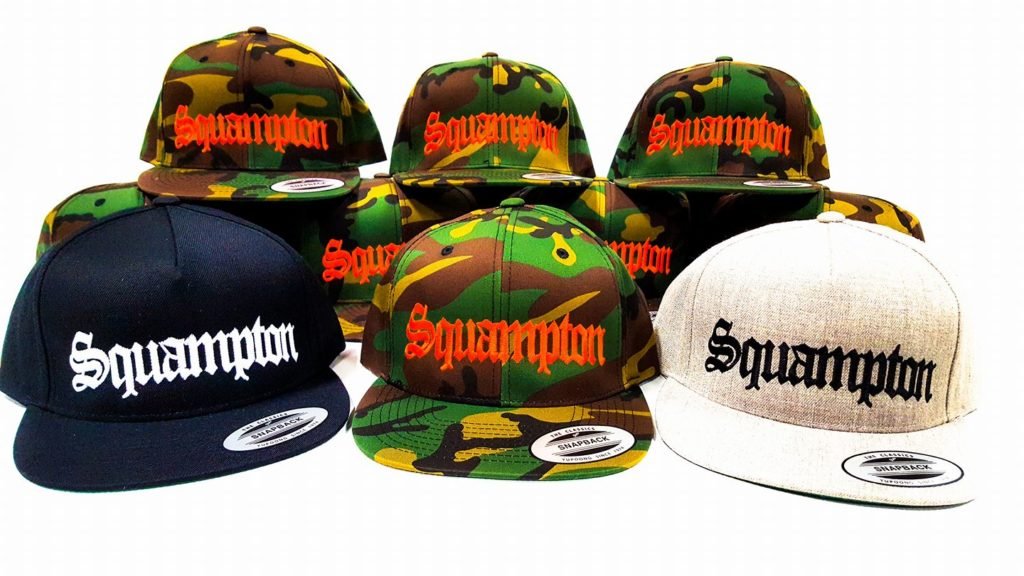
Ironically, it was at about this time that an announcement in Prague, nine time zones away, would set in motion the chain of events that would raise Squamish up from its Squampton grit. On July 2nd, 2003, the International Olympic Committee awarded Vancouver the 2010 Winter Olympics bid. And as part of the associated infrastructural investments, the province of British Columbia invested C$600 million to upgrade the narrow, winding Sea to Sky highway that linked Squamish with points south and north. The announcement set off a real-estate gold rush, which in turn would yield blocks of chintzy condos and strip malls. Local officials rubber-stamped one sprawling mess after another, turning parts of Squamish into another Vancouver commuter exurb.
Families looking to escape Vancouver’s soaring housing prices—some of the highest in the world—began fleeing to Squamish for more affordable options, which of course had the effect of making Squamish unaffordable for many of the people who’d spent their lives there. As a result, old timers, along with their children in many cases, have been leaving in droves. Their lots were claimed by a new breed of Lululemon mom and Patagonia dad. And though we didn’t know it at the time, they also would attract a small but very noisy clique of politically correct authoritarians who didn’t have much taste for we unenlightened common folk.

When George Floyd was killed by a Minneapolis police officer seven months ago, Canadians were justifiably horrified. From coast to coast, many took to the streets to express support with Black Lives Matter. And even tiny Squamish managed to hold a rally that attracted hundreds, including members of our local government. Unfortunately, the town’s activists went further, and started tracking townsfolk deemed insufficiently committed to the anti-racist struggle. Since these social-justice champions typically were recent arrivals from large cities, they could leverage mobs of social-media followers against lifelong Squamish residents whose Facebook and Twitter networks were orders of magnitude smaller.
On June 28th, as Black Lives Matter protests were still taking place across the world, a woke warrior in Squamish took to Instagram to slam an area bike shop, Tantalus Bikes, for selling “Squampton” merchandise. Rebecca Tracey, a self-described “life coach” who’d arrived in town from Toronto just weeks before, claimed in her post that the moniker was “racist,” and urged Squamish to “do better.”
“The town of Squamish, where a small population of Skwxwu7mesh people still live, is otherwise filled with affluent young families who are here for the beautiful scenery, endless adventure activities, and proximity to Vancouver,” she wrote in her (since-deleted) post. “With the world taking a hard look at racism right now, this mocking of Indigenous peoples needs to stop, and banishing ‘Squampton’ stickers seems like an easy place to start.”
The bike-shop owner responded by defending her shop’s gear, noting that “customers who are local First Nations People buy our Squampton merchandise. We had Eminem’s road crew buy us out of our Squampton hats when they were here for Squamish Live [formally known as the Squamish Valley Music Festival]. We haven’t had a single Person of Colour approach us in regard to being offended… The irony of this all is someone like you would have never moved here 15 years ago, before all the tourism and attention it received, and that’s why the people from here like the reminder of the ‘Squampton’ roots, the little town nobody wanted to be in.”
Ms. Tracey, who is white, was having none of it. Nor was her comrade-in-arms, one Jazzamyn Walker, an especially pleasant member of the local social-justice mob. Dropping the high-flown intersectional jargon that sometimes marks these discussions, she told the shop owner there was “no need to be cunty… By your obvious pettiness and cattiness, I can see it is a waste of time. I hate children and I hate adults even more who act like them.”
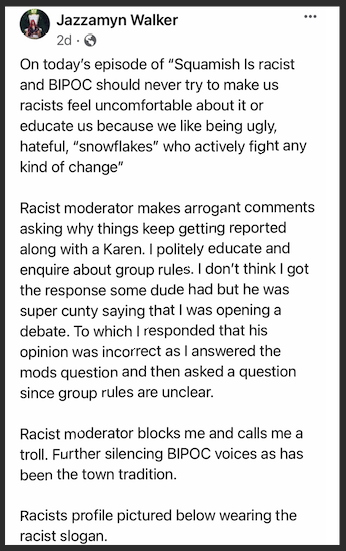
Tracey’s Instagram post attracted about 800 responses—an enormous number for a small-town controversy. Included among them was a hefty dose of vitriol aimed at Ms. Tracey, suggesting that her complaints hardly reflected the community at large. But even if they enjoy majority support on a purely arithmetic basis, small businesses such as Tantalus Bikes now feel obligated to ingratiate themselves to social-justice enforcers, lest they be branded as racist, a commercial mark of Cain in 2020. So the owner waved the white flag, issued a public apology, and withdrew all its “Squampton” swag—this during a pandemic, when, like all retailers, she already was facing unprecedented challenges.
The local newspaper, the Chief, ran a story on the saga, along with an opinion piece asking, “Squamish, are we serious about embracing diversity?” As per the now-usual script, the completely gratuitous mob shaming of a small business was presented as a welcome morality play that could serve to edify the entire community. “No, not every person of colour will be offended by our ‘Squampton’ moniker,” intoned the Chief. “But for every person who isn’t offended, there may be another who quietly thinks to themselves that they are not welcome in our town, nor in our outdoor spaces. People around here often say they are accepting of others from different backgrounds and viewpoints. If they are serious about it, it may be worth thinking about how ‘Squampton’ sounds to some, even if it was created with good intentions. We’re not saying that ‘Squampton’ must be erased from our history, but rather than name-calling those who raise concerns about the phrase, there should at least be some effort made to understand a different viewpoint. If this is too much to ask—that’s fine. And perhaps understandable. But let’s admit, in that case, that diversity is not our priority.”
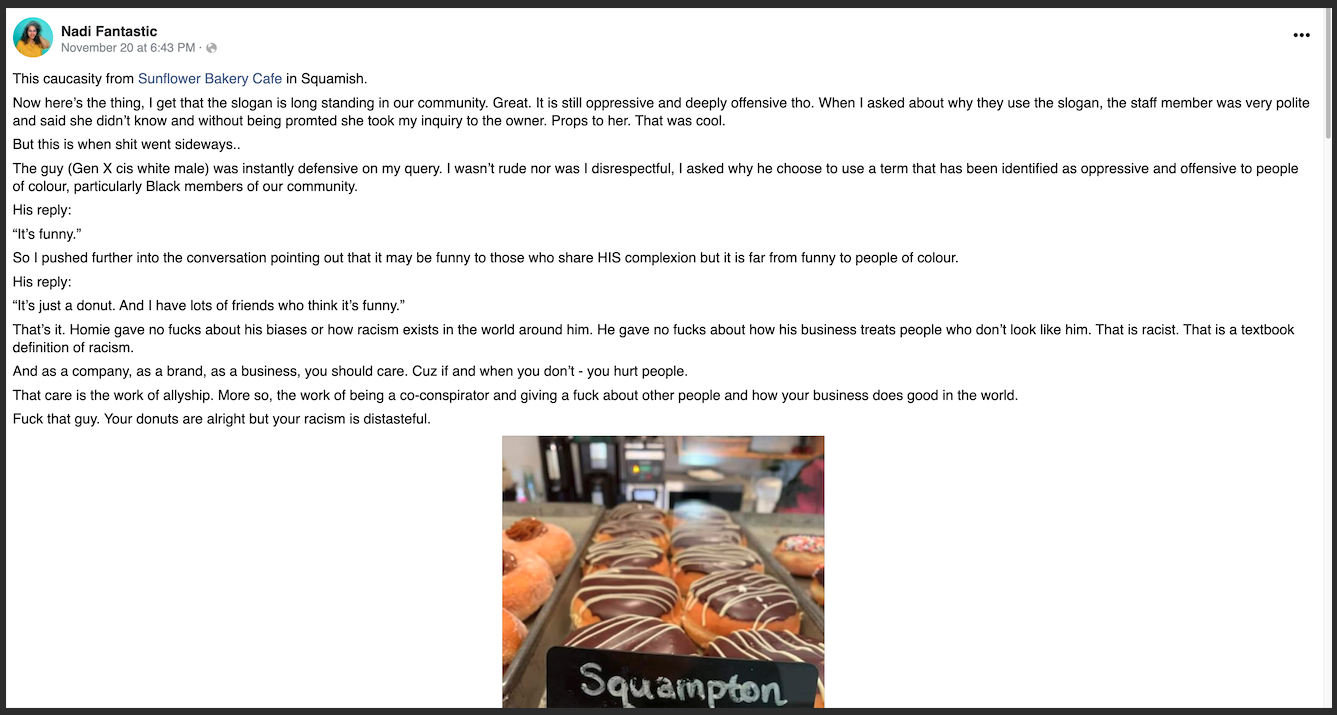
A few months later, they came for the donuts. This time, the attack was led by area resident Nadi Fantastic, a self-described “holistic diversity, equity and inclusion educator centered around intersectional discrimination” who pronounced herself aghast to discover a “Squampton Crème” donut in a local coffee shop. In a November 20th Facebook tirade, she denounced “this caucasity from Sunflower Bakery Café in Squamish”:
Now here’s the thing, I get that the slogan is long standing in our community. Great. It is still oppressive and deeply offensive [though]. When I asked about why they use the slogan, the staff member was very polite and said she didn’t know and without being prompted she took my inquiry to the owner. Props to her. That was cool. But this is when shit went sideways. The guy (Gen X cis white male) was instantly defensive on my query. I wasn’t rude nor was I disrespectful, I asked why he choose to use a term that has been identified as oppressive and offensive to people of colour, particularly Black members of our community. His reply: “It’s funny.” So I pushed further into the conversation, pointing out that it may be funny to those who share HIS complexion but it is far from funny to people of colour. His reply: “It’s just a donut. And I have lots of friends who think it’s funny.” That’s it. Homie gave no fucks about his biases or how racism exists in the world around him. He gave no fucks about how his business treats people who don’t look like him. That is racist. That is a textbook definition of racism. And as a company, as a brand, as a business, you should care. Cuz if and when you don’t—you hurt people. That care is the work of allyship. More so, the work of being a co-conspirator and giving a fuck about other people and how your business does good in the world. Fuck that guy. Your donuts are alright but your racism is distasteful.
In the comments to Ms. Fantastic’s post, the Chief’s editor, Jennifer Thuncher (a white CBC veteran who moved here in 2014), demonstrated her correct #allyship by extravagantly applauding Nadi’s campaign: “Thank you for your continued work to make Squamish a place where all feel safe and welcome, Nadi.” (She later deleted the comment.) And this goes to one of the worst parts of these mob actions: Not only are we supposed to cheerfully endure hectoring lectures about our supposed racism, but also then gush appreciatively, on the pretense that it all somehow improves our community.
Within days, the Sunflower, too, took a knee, agreed to shelve the “Squampton” pastry for good, and to work with Ms. Fantastic to “educate” other downtown businesses about how donuts can be racist. Ms. Fantastic, now very much playing the role of Good Cop, returned to Facebook, this time to praise and gloat: “*Positive Update* After meeting with all four owners of the bakery this morning and engaging in a healthy conversation of listening and sharing.” She also posted a photo of renamed donuts with the caption: “An example of societal evolution. ‘Squamish Crème.’” The message here was clear: Play ball with Nadi and things will go well. It’s effectively the woke equivalent of a storefront “fire insurance” protection racket.
More recently, Ms. Fantastic and her squad targeted the unsuspecting administrator of a Squamish “Buy and Sell” Facebook page. The administrator’s crime was that she’d defied the mob’s demand that she delete an ad for “Squampton” face masks. Ms. Fantastic duly mobilized her minions, informing them she was contacting the administrator’s employer (a well-known chain store). By this time, she’d dropped the pretense that this was about anything except power and retribution, and had disclosed that her actions were part of a template she was developing to pressure residents through their employers: “If you are still on the page [Squamish Buy and Sell], please take screenshots of [the administrator’s] comments and report those specifically. Send me screenshots. Below is my message to [the administrator]. I’m working on a draft letter to go to people’s employers when these situations arise and have already called [the administrator’s workplace] to continue the conversation… Racists have no place in society, especially working in roles involving other people.”
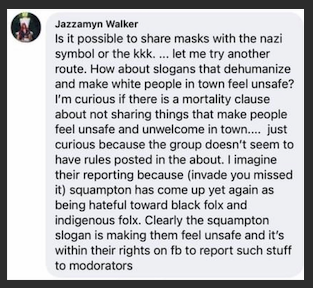
Ms. Fantastic went on to call the targeted page’s administrator—a First Nations single mom, incidentally—”a garbage person all around.” Ms. Tracey (the one who’d initiated the first campaign, against the bike shop) chimed in, denouncing the administrator as an “asshat,” and urging others to report the Indigenous woman for “hate speech.” Ms. Walker (the one who’d accused the bike shop owner of being “cunty,” if you will recall) remarked that “their dumb ass thinks the charter of rights and freedom protects their ‘hate speech.’” She also likened the Squampton face masks to Nazi swastikas and KKK symbols. As with the previous dust-ups, this was a mob largely composed of people who’d only recently arrived in town, attacking those who’d built lives and careers in Squampton for years.
What’s more, Ms. Fantastic revealed that a local “task force” had been established to root out anyone accused of racism. “So this is when the task force would come into action,” she wrote, identifying the mobbing of this First Nations single mother as an edifying case study in community mobilization. “Everyone reported as hate speech and pushing back… I am working with several businesses, members of council, and individuals on a campaign to educate [residents] and retire the [Squampton] slogan.”

As for the Buy and Sell administrator, she recently posted: “I surely hope I don’t lose my job at Christmas time… being a single mom, it’s gonna be hard to bounce back.” Later, she told me that “the stress and anxiety they caused me… uughhh it was horrible, having panic attacks at work worried [Ms. Fantastic and her friends] were going to come in and make a scene.” Then again, as Ms. Fantastic recently posted on her Facebook page, people who complain of woke “bullying” are really just objecting to “accountability.”
Now I know what you must be thinking: “Squampton” is just a word, and, ultimately, it doesn’t really matter if people stop using it. And a good donut by any other name would still taste just as sweet. Moreover, none of this online ugliness changes the fact that Squamish is surrounded by beautiful outdoor amenities. Why not just turn off our phones and hit the trails, right?
Alas, the virus of wokeness has seeped into the Squamish rock-climbing scene and other outdoor subcultures: The same community that featured so much carefree camaraderie back in my heyday is now tearing itself apart with pointless arguments over terminology.
As anyone in this outdoor subculture knows, the renaming of “offensive” route names is an especially popular issue for social-justice enthusiasts. In the climbing world, it’s traditional that the first individual to ascend and establish a new route gets to name it. That means the names reflect the (pre-woke) era in which the terms were coined. And given climbing’s counter-cultural roots, it should come as no surprise that some names are cheeky, off-colour, a bit bawdy, or even downright raunchy—which, in my eyes, makes them all that more interesting. In July, Gripped magazine compiled a list of controversial route names, a news item that made its way onto Canada’s mainstream Global news network. “If it offends somebody, if anybody is offended… just change the name,” Gripped Senior Editor Brandon Pullan told Global, effectively signaling pre-emptive surrender to literally any grievance hunter who came calling. Around the same time, the editor of Rock and Ice resigned from his position because of (legitimately) racist names he’d given to routes 40 years ago.
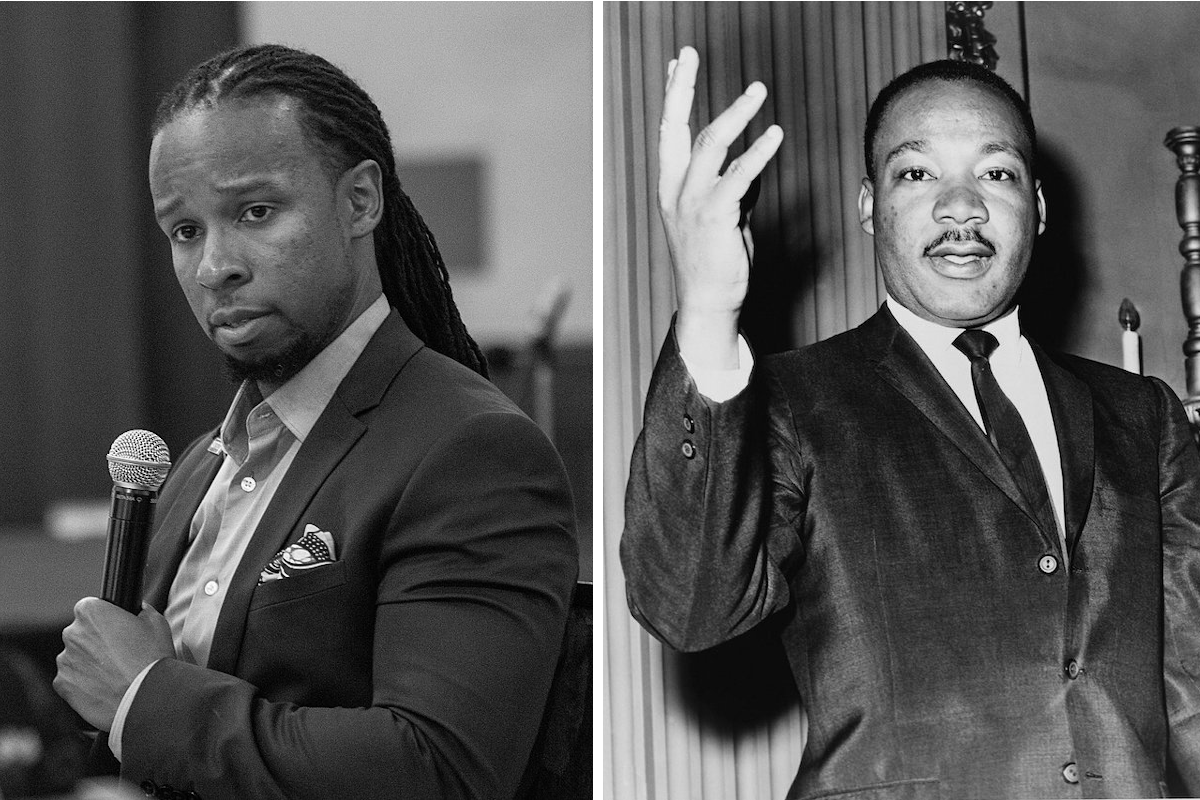
Some climbers are calling for a ban on the word “‘biner,” a well-known contraction for “carabiner,” which is a type of shackle with a safety closure used by climbers. In a 2019 blog entry on Mountaineers.org entitled, “Language Matters: Let’s Stop Using the Slang Word for Carabiner” (he couldn’t even bring himself to put the word in the title), climber Don Sarver wrote that “this word is actually a racial slur which holds a dual meaning. The ‘biner’ slang word for carabiner can be offensive to people of Mexican descent and heritage. While the spelling of the climbing slang term and racial slur [i.e., “beaner”] are different, they are audibly identical. It’s common for people to use the climbing slang term, but I’d like to challenge us, as a club and a greater community, to boldly and proudly set the example for others to follow: Let’s stop using the slang word ‘biner’ and abolish it from the climbing dictionary. Instead let’s embrace the use of the full word: carabiner!”
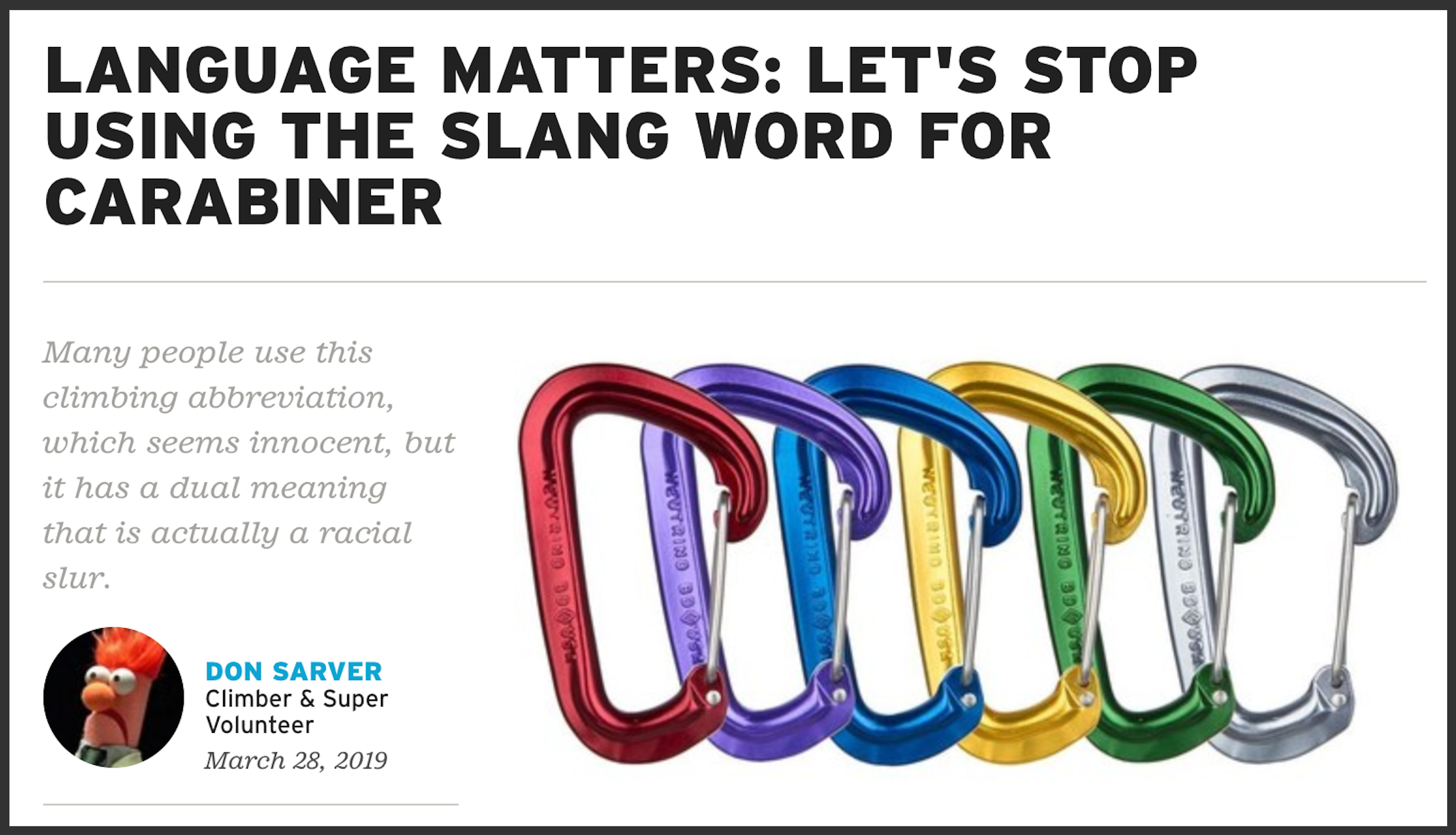
This summer, a group of self-anointed route-name enforcers in Squamish began poring over the local guidebooks, flagging any names they deemed objectionable. One of the first to be called out was “Women in Comfortable Shoes,” which was duly truncated to “Comfortable Shoes.” (The original name was thought to offend lesbians, who, according to a comedic meme, have a thing for comfy footwear.) Another route that got blacklisted was “Black Dyke,” which refers to a dark geological feature—quite literally, a basalt dyke—that sites up the face of the Chief. The whole thing quickly took on the air of Cold War church ladies compiling lists of filthy R-rated films they feared might play at the local Bijou.
While I usually try to stay away from this nonsense, this was all too much for me. And I posted to the Squamish Rock Climbing Facebook page a roster of climbs I thought could “offend” someone in equal measure. Some of the entries (these are real route names) included:
Dreamcatcher: Appropriates First Nation culture. Dreamcatchers are a spiritual tool used by Indigenous peoples.
Sloppy Poppy: Ageist, mocks those suffering from Alzheimer’s.
Superfly: Appropriates black culture.
Mantal Madness: Trivializes mental illness.
Edible Panties: Sexist.
Phat Slab: Fat shaming.
My post was meant as an arch joke, but it’s worth noting that my reasoning really wasn’t much different from that of the humorless scolds who now roam Squampton, policing donut shops and social-media pages. But since my intent was clearly satirical, the local “task force,” as it were, announced itself to be collectively traumatized, and demanded that the moderator delete my post. I was also suspended, with a moderator messaging me privately that, “Your post was not facilitating healthy debate for the issue. It was a demeaning satire that MANY people reported and most reacted negatively to in the comments… It is not a healthy debate to use a slippery slope argument which tries to undermine the other side by making a joke of it.”
He indicated I could return to the group if I “could appreciate why” my post was “inflammatory”—a euphemism for groveling apology. Needless to say, I declined the invitation to confess my sins and seek forgiveness. Which is why I am banned from the page to this day.
My wife, who came to my defense in the group’s comment threads, also got called out for her insensitivity. A group moderator even doxxed her, posting details about her job as a social worker, and suggesting that no one who wasn’t on board with the route renaming campaign could be competent in such a professional milieu. One member argued that “laughing at homophobic/sexist/racist jokes is a reflection of, and contributes to, systemic homophobia, sexism and racism.” When my wife pointed out that some of the world’s most notable comedians, including Dave Chappelle, Wanda Sykes, Ricky Gervais, Jerry Seinfeld, and Tina Fey, also poke fun at “marginalized” people, the same poster wrote that this, too, was a serious problem. And it occurred to us that the same people seeking to scrub joy from climbing routes and donut shops have of course been waging a similar campaign in the realm of entertainment. This is simply how church ladies think: Laughter marks you as a suspect.
For those who actually do care about improving the world through their social-justice advocacy, Squamish is hardly lacking in real problems—such as the rampant commercial development that’s destroying wildlife habitats, or the chronic homelessness. But, of course, that would require actual work, the kind that isn’t glamorous and which requires you to roll up your sleeves instead of tapping on a keyboard. Verbally carpet bombing a café or harassing an Indigenous mother is easy—and you reap a nice harvest of hearts and emojis from the local media for your troubles.
There is some good news, however. Thanks to Etsy and Amazon and modern computer technology, you don’t need a store or a factory to print up a sticker. And a Squampton-themed cottage industry has sprung up in local months—Samizdat for a woke age. By my observation, in fact, there are more Squampton stickers around town than before this idiotic brouhaha broke out. And the controversy has at least alerted the town’s silent majority to the fact that, if we don’t stand up for ourselves, we’re going to continue being bossed around by preening moralists who, until about 15 minutes ago, would have believed “Squamish” was a Whole Foods turnip.
Unusually for a small town, Squamish has not one but two news publications—the aforementioned Chief, and the Squamish Reporter. Unlike the white-run Chief, the Reporter has a BIPOC (to use the now preferred term) editor, one Gagandeep Ghuman. And his perspective is an interesting one.
“With the long-drawn debate on the use of Squampton stickers, the medieval witch-hunt (styled these days as liberal and progressive activism) has reached Squamish too,” wrote Mr. Ghuman in a July 12th column. “A few days ago, I asked a vocal resident to write on the issue. She flatly refused, afraid that she would be hounded out of her job if she expressed any view not in line with the dominant woke discourse. But… my own story—and of many other local people of colour I know—defies stereotypes of race relations… Within weeks of my starting a news blog [in 2011] strangers were willing to share their life stories with me without any regard to the colour of my skin. Against my apprehensions, I was being encouraged by locals to write and report more about not only the civic issues but also their personal lives… Conventional wisdom dictated that a person of colour locking horns with the powerful white elite in a small town will never succeed. My experience was the opposite. My aggressive reporting brought praise and encouragement from readers who mostly happened to be white.”
“I had an inkling before I came to Squamish that racism could have its own diversity,” he added. “In Squamish, I saw it. I faced racism from some who styled themselves as liberal and progressive… Their ideas have come to assume the force of theological certainty.” As toxic as Nadi Fantastic’s campaign has been, the least that can be said for it is that she’s gotten people like Mr. Ghuman to push back at the shallow, condescending approach to race relations embraced by Ms. Fantastic’s “task force.”
As for me, I’ve personally anted up for three Squampton bumper stickers and a “Straight Outta Squampton” t-shirt.
Now we just need to bring back the Squampton Crème.
Correction: The originally posted version of this article inaccurately described the July 23, 2020 Squamish Chief article entitled “Squamish, are we serious about embracing diversity?” as an editorial that appeared on the front page of a print edition of the Chief newspaper.






